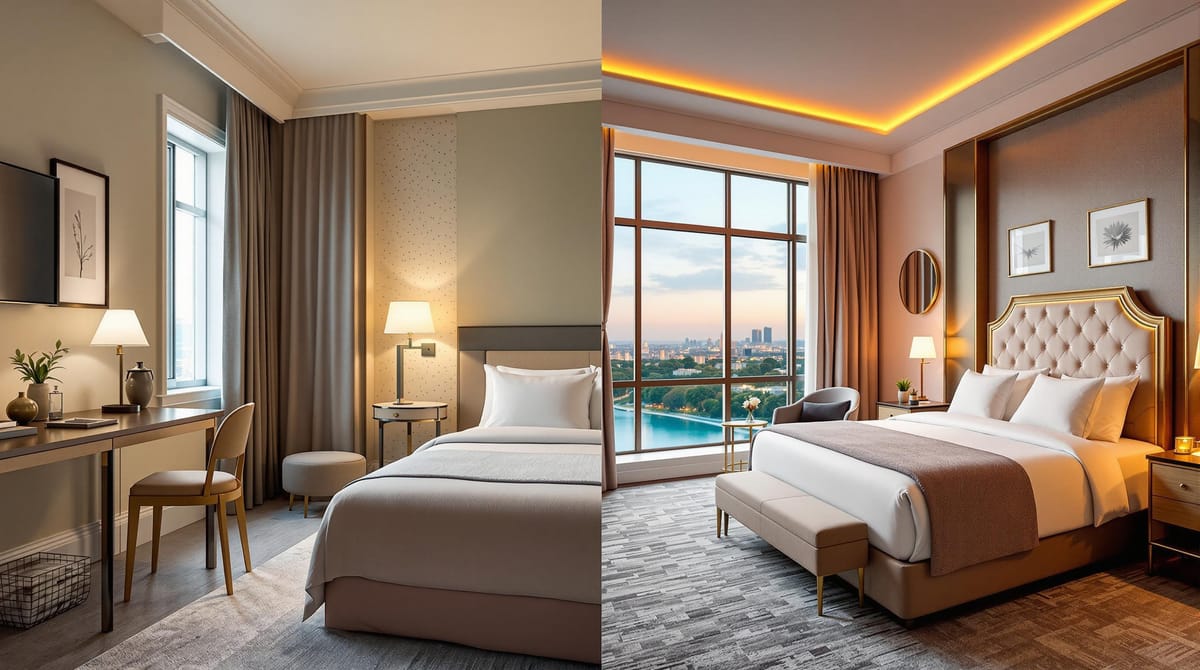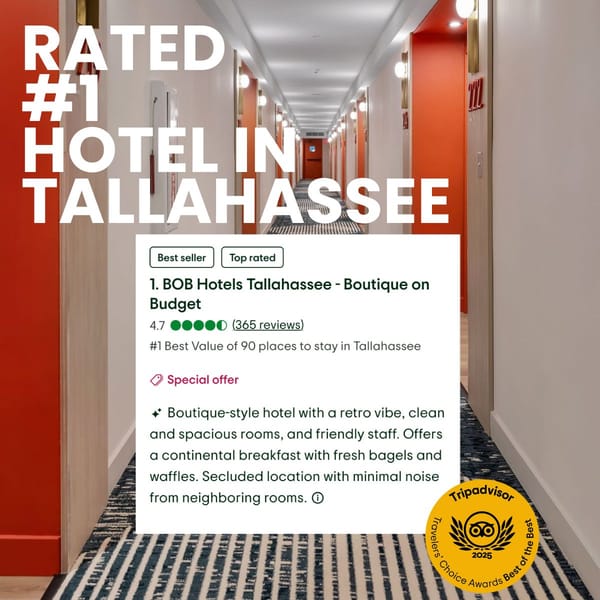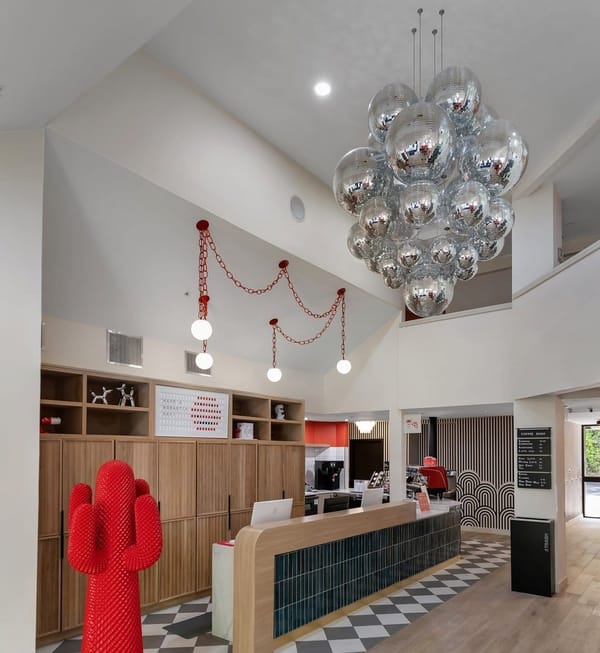Budget vs Luxury Hotels: What You Really Get for Your Money
Explore the key differences between budget and luxury hotels, helping you decide which type best suits your travel needs and priorities.

Choosing between budget and luxury hotels depends on your travel needs, budget, and priorities. Here’s what you need to know upfront:
- Budget Hotels: Affordable ($50+/night), basic amenities (Wi-Fi, simple breakfast), practical locations (near transport hubs), and efficient service. Ideal for cost-conscious travelers.
- Luxury Hotels: Expensive ($300+/night), upscale amenities (spas, gourmet dining), prime locations, and personalized service. Perfect for indulgent or special occasions.
Quick Comparison
| Aspect | Budget Hotels | Luxury Hotels |
|---|---|---|
| Price | $50-$75/night | $300+/night |
| Amenities | Basic (Wi-Fi, breakfast) | High-end (spa, fine dining) |
| Service | Standardized, efficient | Personalized, anticipatory |
| Location | Near transport hubs | Prime, central areas |
| Ideal For | Budget-conscious travelers | Those seeking luxury |
Key takeaway: Budget hotels offer practicality and savings, while luxury hotels focus on comfort and exclusivity. Choose based on your trip's purpose and priorities.
Luxury vs. Budget Hotels: Unveiling the True Differences
Differences in Amenities
The contrast between budget and luxury hotels becomes especially clear when you look at their amenities. According to the 2024 North America Hotel Guest Satisfaction Index Study, guest experiences vary widely depending on the type of hotel [6].
Amenities in Budget Hotels
Budget hotels, such as Holiday Inn and Hampton Inn, prioritize basic comforts like free Wi-Fi, simple breakfasts, and standard room features - all at affordable prices.
| Basic Amenity | Common Features |
|---|---|
| Internet | Free Wi-Fi |
| Breakfast | Basic buffet options |
| Fitness | Limited gym facilities |
| Room Features | Standard toiletries, basic television |
For instance, BOB Hotels Tallahassee has redefined what budget hotels can offer by including perks like smart TVs, high-quality mattresses, specialty coffee, and even a plunge pool - all while keeping costs reasonable.
Amenities in Luxury Hotels
Luxury hotels, such as those in The Luxury Collection, go above and beyond to provide an elevated experience with top-tier amenities.
| Premium Amenity | Distinctive Features |
|---|---|
| Dining | Gourmet restaurants, 24/7 room service |
| Wellness | Full-service spa, large fitness centers |
| Technology | High-speed internet, premium entertainment |
| Room Features | High-end toiletries, luxurious linens |
"Andrea Stokes, Hospitality Practice Lead at J.D. Power, emphasizes that longer guest stays demand higher standards in cleanliness, facilities, and service."
These differences highlight not just the price gap but also the varying levels of comfort and satisfaction guests can expect. While amenities create the foundation for a guest's stay, service quality plays a key role in shaping the overall experience at both budget and luxury hotels.
Service Quality and Personalization
The difference between budget and luxury hotels becomes clear when you look at how they deliver service and interact with guests. Service quality not only impacts a guest's immediate satisfaction but also shapes their view of whether they got their money's worth. According to the American Hotel and Lodging Association, 75% of guests say service quality is a key reason they choose to return to a hotel [7].
Service in Budget Hotels
Budget hotels focus on efficiency by using strategic staffing and streamlined processes. Digital tools like automated check-ins help them maintain consistent service while keeping staff numbers low.
| Service Aspect | Budget Hotel Approach |
|---|---|
| Staff Training | Employees trained to handle multiple roles |
| Check-in/out | Fast, standardized processes |
| Guest Assistance | Basic support during limited hours |
| Room Service | Often unavailable or very limited |
| Technology Integration | Self-service kiosks and automated systems |
Service in Luxury Hotels
Luxury hotels stand apart by offering personalized attention and anticipating guest needs. With a high staff-to-guest ratio, they provide services like butlers, personal chefs, and tailored experiences, all delivered by highly trained professionals.
| Service Aspect | Luxury Hotel Approach |
|---|---|
| Staff Training | In-depth hospitality training focused on anticipating needs |
| Guest Relations | 24/7 concierge and personal assistants |
| Customization | Personalized room setups and curated experiences |
| Exclusive Services | Butler service, chauffeurs, personal chefs |
| Technology Integration | Smart room controls and digital concierge services |
Luxury hotels often go a step further by offering unique local experiences customized to guest preferences [3]. For these establishments, service quality is a major factor in building guest satisfaction and loyalty [7].
While service quality is key to guest interactions, the overall experience and perceived value for money are equally important when deciding between budget and luxury options.
Experience and Value for Money
Choosing the right hotel often comes down to balancing your priorities and budget. Here's a closer look at what different types of accommodations offer.
Budget Hotels: Focused on Affordability
Budget hotels aim to provide the basics at wallet-friendly prices. They focus on delivering practical benefits like:
| Feature | How It’s Delivered |
|---|---|
| Cost-Saving Design | Smart room layouts and durable furnishings |
| Basic Amenities | Free Wi-Fi, simple breakfast options |
| Convenient Locations | Near public transport or highways |
| Typical Price | $35-75 per night |
Luxury Hotels: All About the Experience
Luxury hotels cater to guests looking for an elevated stay, offering:
| Feature | How It’s Delivered |
|---|---|
| High-End Design | Spacious rooms with stylish interiors |
| Gourmet Dining | Multiple restaurants serving fine cuisine |
| Wellness Options | On-site spas and fully equipped gyms |
| Exclusive Perks | VIP lounges and personalized services |
Comparing Budget and Luxury Hotels
The experience you get differs greatly between budget and luxury hotels. Here's how they stack up:
| Aspect | Budget Hotels | Luxury Hotels |
|---|---|---|
| Main Focus | Practical and affordable | Comfort and exclusivity |
| Ideal Guests | Travelers on a budget | Those seeking luxury or prestige |
| Room Features | Clean and simple | Elegantly designed with premium touches |
| Amenities | Basic essentials | Extensive, high-end facilities |
| Service Style | Standardized and efficient | Tailored to individual needs |
| Location | Close to transport options | Prime or upscale areas |
Choosing the right hotel isn’t just about the cost - it’s about finding the one that matches your travel style. Whether you're looking to save or splurge, understanding these differences can help you make the best choice for your trip.
Choosing the Right Hotel
Deciding between budget and luxury accommodations depends on your needs and circumstances. Here's how to weigh your options effectively.
Purpose and Priorities
Your reason for traveling will largely guide your choice of accommodations. For example:
- Business trips: Budget hotels near transport hubs with reliable Wi-Fi often work well.
- Special occasions: Honeymoons or anniversaries might call for luxury hotels to create memorable experiences.
- Family vacations: Budget or mid-range hotels with practical amenities can help save costs.
- Solo travel: Basic accommodations with essential comforts can provide great value.
Timing and Location
When you book and where the hotel is located can significantly affect your experience. Luxury hotels often drop their rates during off-peak seasons, making them more affordable. Location also plays a role:
| Destination Type | Budget Hotels | Luxury Hotels |
|---|---|---|
| Urban Areas | Near transport hubs | Prime downtown locations |
| Resort Areas | Short walk to attractions | Direct beach or resort access |
| Airport Vicinity | Shuttle service available | Close to terminals |
Getting the Most for Your Money
Here are a few tips to make the most of your hotel choice:
- Compare prices across booking platforms, but watch for hidden fees like parking or resort charges.
- Factor in your stay length and the amenities you'll need when considering daily rates.
- Check proximity to your planned activities and transportation options.
"The star rating and what it implies for the hotel experience is crucial when making your choice", says Ashley Blake, founder of Traverse Journeys [5].
Budget-friendly hotels like Days Inn or La Quinta Inn and Suites start at around $50 per night [4], while luxury hotels come with higher price tags for added perks. Focus on what fits your travel needs rather than aiming for prestige.
When deciding, think about your total budget, including extras, and prioritize the amenities you can't do without. The best choice balances practicality with the experience you want, ensuring you get the most out of your stay.
Conclusion: Making a Choice
When deciding on a hotel, your travel goals and personal priorities should guide your choice. A 2024 study involving 39,468 hotel guests highlights a noticeable drop in satisfaction levels for limited-service hotels [6]. This makes it even more important to weigh your options carefully.
Budget hotels are ideal for travelers looking to save money while still enjoying a clean and comfortable stay. On the other hand, luxury hotels cater to those seeking a more indulgent experience, offering top-notch service and a wide range of amenities. Here’s a quick comparison to help you decide:
| Aspect | Budget Hotels | Luxury Hotels |
|---|---|---|
| Value Proposition | Basic comforts, clean rooms | High-end amenities, personalized attention |
| Target Experience | Practical and straightforward | Memorable and indulgent |
| Service Level | Friendly and efficient | Tailored and anticipatory |
Travel habits are shifting, too. A growing trend for 2024-2025 shows people are taking fewer trips but opting for longer stays [6]. This change emphasizes the importance of choosing accommodations that deliver value over an extended period.
Ultimately, your decision should be based on what matters most to you. Whether you’re stretching your budget for a longer trip or splurging on a premium experience for a special occasion, both budget and luxury hotels cater to different needs. Align your choice with your priorities to ensure a satisfying travel experience.
FAQs
What is the difference between a budget hotel and a five-star hotel?
Budget and luxury hotels differ in several key areas, from pricing to service style and overall experience. Here's a quick comparison:
| Feature | Budget Hotels | Five-Star Hotels |
|---|---|---|
| Starting Price | $50+ (e.g., Days Inn) | $300+ per night |
| Core Focus | Basic comfort, efficiency | Exclusive experience, personalization |
| Service Style | Standardized, practical | Customized, anticipatory |
| Location | Near transport hubs, quieter areas | Prime, high-end locations |
Budget hotels are designed to offer affordable stays with consistent quality. They focus on providing essential amenities and efficient service, which appeals to practical travelers looking for value [1][2]. On the other hand, five-star hotels aim to deliver a premium experience with personalized attention and upscale facilities [3].
Here are some of the standout differences:
- Service Style: Budget hotels focus on standardized services, while five-star hotels go the extra mile with tailored, proactive service [1][2].
- Amenities: While budget hotels stick to the basics, five-star hotels feature luxurious amenities like spas, fine dining, and concierge services [3].
- Experience: Budget options prioritize practicality, whereas five-star hotels create indulgent, memorable stays [4].
Interestingly, many travelers are now leaning toward budget hotels that offer good quality without breaking the bank [4]. However, the gap in service and amenities between budget and luxury hotels remains quite noticeable [1][3].
Choosing between the two depends on what matters most to you - practicality and cost or luxury and personalization.




